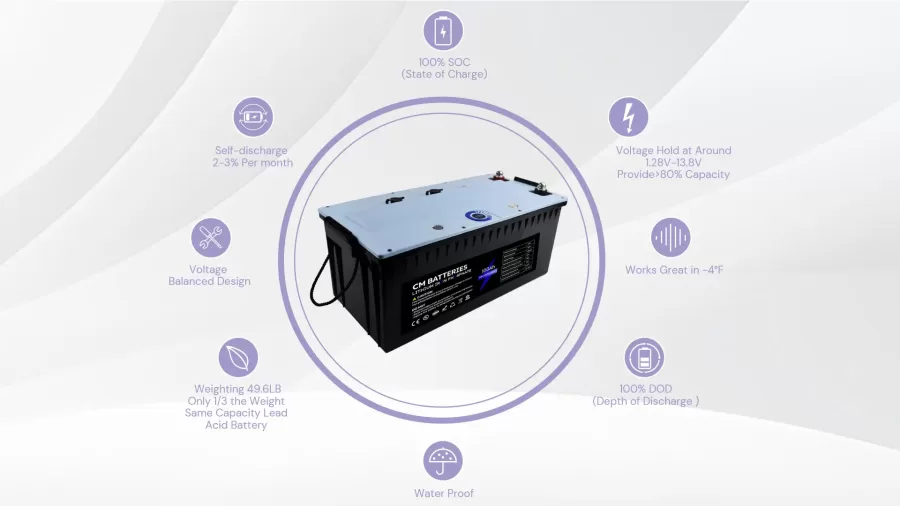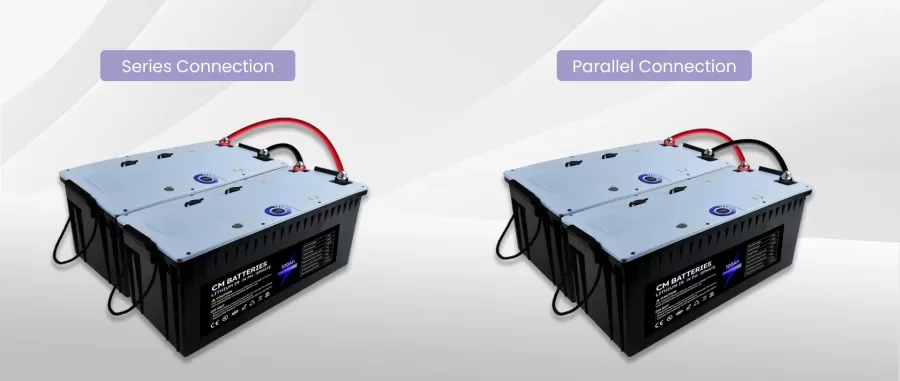When you take your boat out to sea, you want peace of mind knowing that your boat is running on the best equipment possible. For an increasing number of boat owners, this means taking advantage of the convenience and efficiency of a lithium-ion battery. However, there are many options and alternatives to choose from. In this article, we’ll walk you through everything you need to know about choosing the right lithium ion batteries for marine use.
What are The Advantages of Lithium Batteries for Marine Use?
Lithium batteries offer multiple benefits over standard lead-acid batteries. They are lighter, more compact, and have a better energy density, allowing boat owners to have more power in a smaller package.
Furthermore, lithium marine battery has a longer lifespan, can be charged more quickly, and may be drained to a lower state of charge without damage.
Choosing a more efficient and more durable battery will benefit you in the long run, both practically and financially.
How Do I Choose The Right Lithium Battery for My Boat?
Before delving into the specifics, it’s important to figure out if lithium boat batteries are appropriate for everyone. While lithium batteries offer a number of advantages, they may not be the best choice for every boat owner.
About lithium pros marine batteries, here are some additional factors to consider when deciding if lithium marine batteries are right for you:
1. Budget
While lithium batteries may have a higher beginning price than other marine battery solutions, keep in mind the long-term benefits and cost advantages they give. Because of its raised lifespan and lack of repair, lithium batteries can provide considerable savings in the long term.
2. Power Requirements
To choose your lithium batteries for boats, you’ll need to know how much power your boat requires. Generally, the larger the boat, the higher the voltage required. Smaller boats usually use 12v 100ah lithium marine battery, while larger boats usually use 24V or 48V lithium batteries.
In addition to energy required to power your boat, consider the appliances, equipment, and systems you’ll be using. Make a list of their power requirements, including their projected power usage and runtime. This evaluation will assist you in determining the capacity and quantity of batteries required for a consistent power source during your maritime adventures.
3. Weight and Size
Lithium batteries are smaller and lighter than their lead-acid counterparts, making them the best choice to optimize space and weight on your boat. After all, you don’t want to be carrying extra weight out to sea, and you certainly don’t want to take up valuable space on your boat if you don’t have to.
4. Safety Features
Safety should always be a top priority, especially at sea. Lithium batteries come equipped with built-in safety features that protect both your vessel and yourself from potential hazards. Look for batteries that include protection against short circuits, over-temperature, over-current, and low voltage. Additionally, consider batteries with integrated fire-resistant casing and advanced thermal management systems to guarantee reliable and secure operation, even in extreme conditions.
Whether you have specific power requirements, space limits, or weight constraints, lithium batteries may be the ideal solution for your sailing needs. Contact a marine battery professional to figure out whether lithium batteries are the best solution for your specific marine setup.

What is The Best Battery for Marine Use?
The best battery for your marine equipment is a Deep Cycle Lifepo4 Battery. Here’s how they work.
The LiFePO cells and the Battery Management System (BMS) are the two main components of a CMB LiFePO4 battery. Both are enclosed within a sealed battery housing. The quality of each component is critical to the battery’s longevity and performance.
LiFePO cells are wired in parallel to form a module that produces 3.2 volts of power. Four of these modules are connected in a series to form a 12.8-volt LiFePO4 battery, and eight modules are connected in a series to form a 25.6-volt battery.
Each battery includes a battery management system (BMS) that keeps track of the temperature, charge, and discharge of each cell. The BMS prevents deep discharge by removing the load and prevents overcharging by limiting the current or terminating the charging process. The BMS will shut the system down if the battery temperature falls outside of a certain range.
Our most popular CMB 12V LiFePO4 battery has a capacity of 100 Amp Hours (Ah) and is about the size of a group 20 lead-acid battery. LiFePO4 batteries are also rated for their maximum discharge capacity, which is generally 80 – 100 amps. While the maximum discharge capacity of a LiFePO4 battery is about 80-100 amps, the discharge capacity of most CMB LifePO4 batteries is between 100 and 200 amps.
What are The Benefits of Using a CMB LiFePO4 Marine Battery?
There are a wide array of benefits to using a CMB LiFePO4 battery, from the vast amount of features to overall efficiency. For example, LiFePO4 batteries can handle 2,000-6,000 charge/discharge cycles at a 90% discharge, while lead-acid batteries can only handle 300-500 charge/discharge cycles at a 50% discharge. Here are the benefits of using a CMB LiFePO4 battery:
- CMB LiFePO4 batteries keep a voltage of 13 to 13.4 volts at up to a 95% discharge rate. This means many devices will operate more efficiently throughout the discharge cycle using LiFePO4 batteries than they would using lead-acid batteries.
- The BMS in CMB batteries can continuously discharge at a rate of 100 amps without damaging itself.
- CMB LiFePO4 batteries have Bluetooth so you can easily monitor your battery’s State of Charge (SOC). This feature allows you to monitor each battery in real-time using an app on your Android or IOS device. The app shows the SOC, amp draw, voltage level, temperature, time to full charge, and number of charge/discharge cycles, allowing you to easily keep track of your battery’s condition from the convenience of your phone.
- CMB LiFePO4 batteries have an IP68 waterproof rating, meaning they can survive being submerged underwater. Even if your battery were to fall into a large body of water, your BMS and battery cells would avoid damage.
- CMB 12V LiFeO4 batteries have a self-heating feature to make charging safer and more efficient in winter. This feature can heat the battery to above -20°F, improving energy efficiency.
- Our batteries can be connected in a series to increase voltage or in parallel to increase capacity.

Can my Marine Battery Explode?
Yes, marine batteries can explode if not handled properly. This is true for both lithium and lead-acid batteries. However, if you understand the causes of battery explosions, you can prevent such explosions and ensure a safe boating experience. Here are some common factors that can lead to battery explosions:
Overcharging
Overcharging a battery can cause gas buildup and dangerous pressure levels, which may lead to an explosion. It is essential to use chargers equipped with advanced Battery Management Systems (BMS) that protect against overcharging.
Using the Wrong Charger
Using the wrong charger for lithium batteries can cause overheating and dangerous outcomes due to incorrect charging voltages. Use chargers tailored to lithium deep cycle marine battery and follow the manufacturer’s guidelines for proper charging.
Ignoring Battery Damage
Damage to the battery, such as punctures, cracks, or leaks, could put the battery casing’s integrity at risk. This damage can cause burning or explosive gas to be released, putting you at risk of an explosion.
Neglecting Ventilation
Inadequate ventilation in battery compartments can cause gas buildup, increasing the danger of explosion. Having enough air flow around the battery is important to eliminate any gases it might produce.
Exposing Your Battery to Extreme Temperatures
Extreme temperatures can cause batteries to fail and perhaps explode, particularly heat. Keep batteries safe from high temperatures and follow the manufacturer’s stated operating temperature range to ensure safe handling.
While lithium batteries are not as likely to explode as older lead-acid batteries, it’s still crucial to understand the common causes of explosions to avoid any dangerous oversights.
What Are The Tips For Using Lithium Batteries For Marine Use?
To improve the performance, lifespan, and safety of your lithium ion marine battery, follow these basic rules and suggestions.
- Choose trusted brands: Pick lithium batteries from reliable manufacturers with a good reputation for quality and dependability.
- Follow the manufacturer’s guidelines: Read and understand the manufacturer’s setup, charging, and service instructions and guidelines carefully.
- Use Battery Management Systems (BMS) or battery monitoring systems to protect batteries from overcharging, over-discharging, and overheating.
- Check that the voltage of your lithium batteries matches the voltage of your boat’s electrical system.
- Lithium batteries can handle more discharge than lead-acid batteries, but it’s still important to not go below 20% capacity.
- Keep lithium batteries away from extreme temperatures to ensure they work well and last long.
- Check your lithium batteries frequently for signs of decline, leakage, or swelling. Also, clean and look at battery terminals regularly to ensure correct connection.
- When not using your batteries for a long time, store them correctly according to the manufacturer’s instructions. For lithium batteries, it’s best to store them with around 40-60% charge.
Follow these tips for the best performance, long life, and safety of your lithium batteries during your marine adventures, to help you get the best marine lithium battery. If you have any questions, consult us for timely assistance.
Conclusion
Selecting the right battery for your boat can seem like a daunting task, but it doesn’t have to be. At CMB, we’d be happy to guide you through the process to ensure your boat is well-equipped with a safe and efficient battery. If you have any questions, we’d be happy to assist. Contact a CMB representative today!


